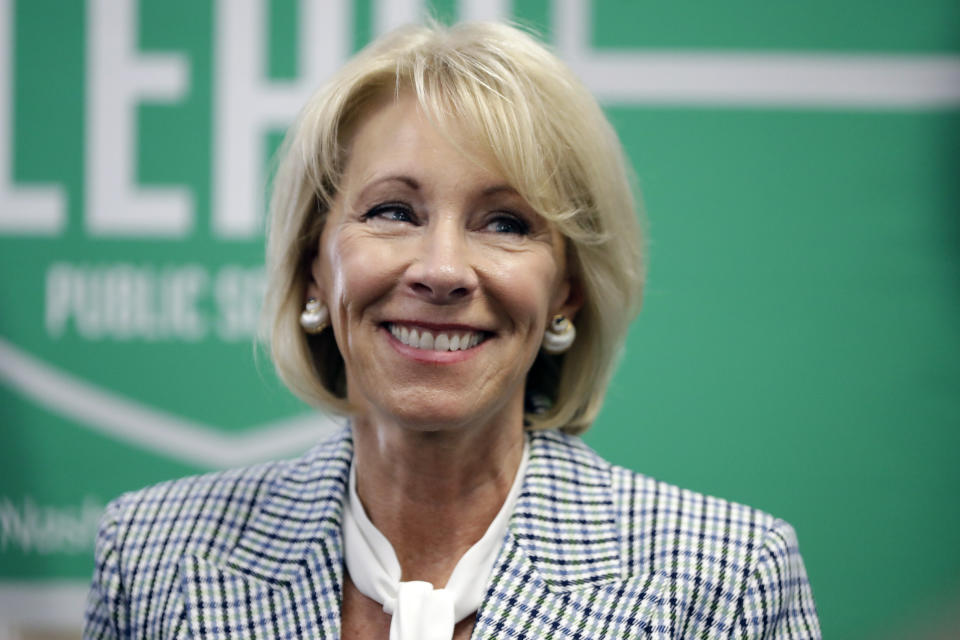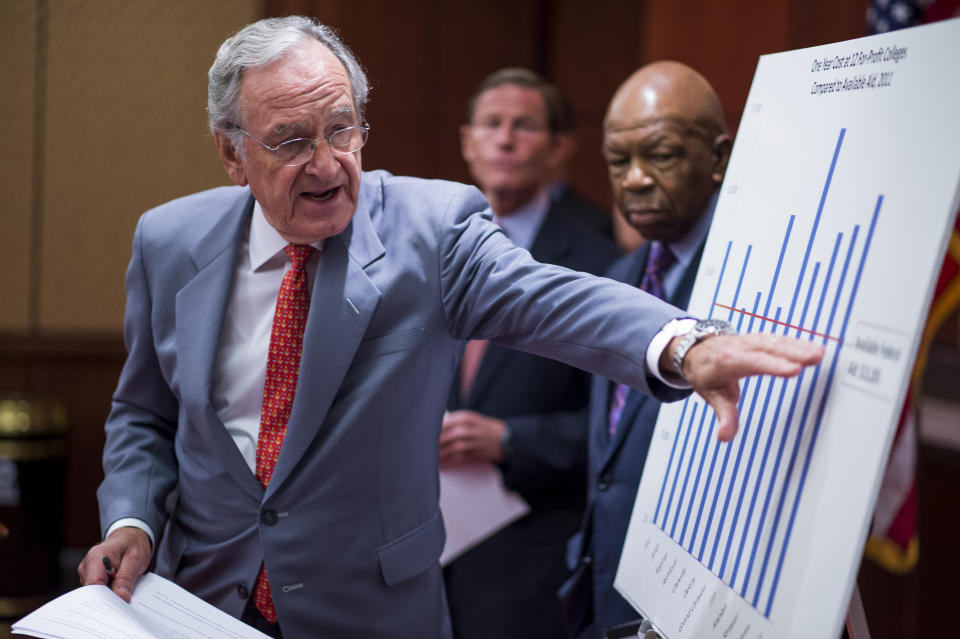Some for-profit colleges double dip in both PPP and CARES coronavirus stimulus
For-profit colleges across the U.S. received millions of dollars from the federal government in response to the coronavirus pandemic, with some acting as both businesses and higher education institutions.
According to data compiled by Accountable.US, a nonpartisan government watchdog group, 114 for-profit colleges received at least $64 million through the Paycheck Protection Program (PPP). And within that list, many were also allocated money by Education Department (ED) through the CARES Act.
“Few industries have received more special treatment from the Trump administration than for-profit colleges, and an invitation to double dip in taxpayer money is the latest example of that,” Derek Martin, a spokesperson for Accountable.US, told Yahoo Finance in a statement.
The Trump administration rolled back key protections for students defrauded by for-profit colleges, leading to multiple lawsuits from attorneys general and others against ED Secretary Betsy DeVos and the agency. Consumer advocates worry that predatory for-profit colleges could thrive in the pandemic-induced recession like they did during the Financial Crisis.

David Halperin, a lawyer and a policy advocate who works on issues regarding for-profit colleges, worked with Yahoo Finance to identify schools with a troubled history.
“In these hard times, I appreciate the value of saving people's jobs,” Halperin said. “But the for-profit colleges that have been caught deceiving and overcharging students, leaving many with overwhelming debt, should have stopped getting taxpayer dollars a long time ago and sending them millions more now only compounds the harms to students.”
Premier Education Group
The biggest name on the list is Premier Education Group, a Connecticut-based firm that received between $2 million to $5 million in PPP funds while some schools in the company’s portfolio received CARES Act money.
Premier Education Group owns multiple trade schools, including Branford Hall Career Institute, Salter College, The Salter School, and Harris School of Business.
Branford Hall Career Institute was allocated more than $700,000 by ED through the first round of distribution of money that Congress provided through the CARES Act.
“An industry with a reputation of fleecing student borrowers should not have had easier access to PPP money than the tens of thousands of actual small businesses that ran into a wall of bureaucracy and got no help at all,” Martin, the spokesperson for Accountable.US, said.
Another school in Premier’s portfolio, Harris School of Business, was allocated more than $1.4 million by ED through the CARES Act.

Premier has faced scrutiny in the past for allegedly shady practices.
In 2014, then-Massachusetts Attorney General Martha Coakley accused the firm, specifically Salter College, for making “unfair or deceptive representations concerning various aspects of its educational programs and services” regarding promotional informational such as job placement rates and services.
In 2019, Salter College agreed to provide debt relief of over $1.6 million to resolve the allegations put forth, and to close its doors by the end of the school year. (Students who attended Branford Hall Career Institute in Springfield, Mass., and Salter School in Fall River and/or Malden, between April 1, 2016 and March 31, 2018, are affected by the settlement.)
In 2014, former employees of the Harris School of Business alleged that the school officials “routinely misled students about their career prospects.”
In 2019, New Jersey Attorney General Gurbir. S. Grewal took action against the school to end advertising that its students are eligible to receive state supplemental loans to pay for college.
Grewal’s office stated that the school had high default rates: The cohort default rate for the school’s Cherry Hill and Linwood campuses was 35% in 2015. The average cohort default rate for schools in New Jersey was only 9.7%, the AG’s office noted.
Yahoo Finance reached out to Premier and has yet to receive a response.

Bay State College
Bay State College, another private for-profit college in Massachusetts, received between $1 million to $2 million from the PPP. The school was also allocated nearly $800,000 by ED through CARES.
Bay State also came under Massachusetts AG Healey’s fire in 2017 for using illegal telemarking practices and misrepresenting job placement figures, among other reasons. The school settled with the AG’s office for $1.1 million.
Yahoo Finance has reached out to Bay State and has yet to receive a response.
Accreditor also receives PPP loan
To complicate matters further, state accreditors, such as the Accrediting Council for Independent Colleges and Schools (ACICS), also received PPP loans between $150,000 and $350,000.
ACICS was stripped of its ability to accredit schools in December 2016 by the Obama administration for not complying with “federal recognition criteria” because of “the agency's lack of effectiveness in applying those criteria.”
In mid-2018, Secretary Betsy DeVos restored the organization’s status.
However, after a damning USA Today report detailing how ACICS accredited a school that reportedly had zero students and no faulty or classrooms, the ED launched an investigation into ACICS.
It’s unclear where the investigation stands — but POLITICO noted that ED has paused action on ACICS until after the election.
Yahoo Finance has reached out to ACICS and has yet to receive a response on its PPP loan.
—
Aarthi is a reporter for Yahoo Finance covering consumer finance and education. Follow her on Twitter @aarthiswami. If you attended a for-profit college and would like to share your experience, reach out to her at [email protected]
Read more:
'They stole my time’: For-profit college students share horror stories
Read the latest financial and business news from Yahoo Finance
Follow Yahoo Finance on Twitter, Facebook, Instagram, Flipboard, SmartNews, LinkedIn,YouTube, and reddit.
